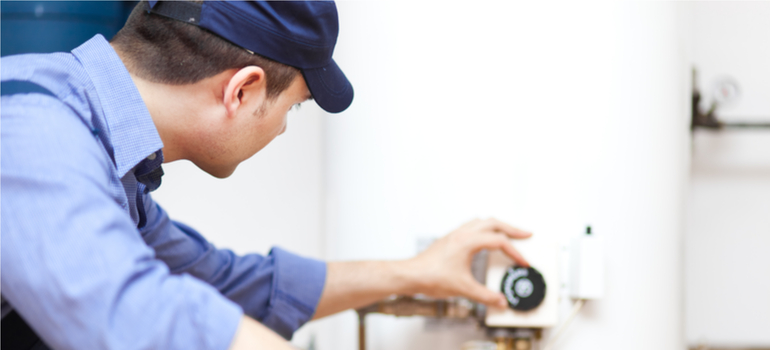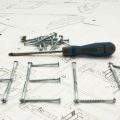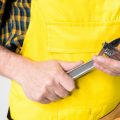
A leaking boiler pipe is never a pleasant sight to see, it’s often quite troublesome, and sometimes there might even be dangerous consequences.
Boiler pipe leaks are most common around Christmas and that shouldn’t surprise anyone. Cold weather is the main reason why people look for plumbers.
Table of Contents
Is a leaky boiler dangerous?
No. Usually, at least. And that’s all the good news you will get. There is always a problem with electrocution, but almost all boilers have a safety fitting for this kind of situations.
However, this doesn’t mean you should leave the issue unresolved. A faulty water heater might cause some serious and costly property damage not just to you, but to your neighbours as well.
It’s not recommended to try and fix the leak by yourself as you may cause the whole system to lose its protective inhibitor.
What you must know, however, is how to turn the hot and cold water supply off. Do it as soon as you notice the leak to ensure your safety, and call a technician immediately. This guide will help you find the right local heating engineer qualified to work on boiler appliances.
Why Does the Boiler Pipe Leak?
Pressure Issues
Every boiler has a pressure outlet pipe on the side. This fitting allows the pressure inside to escape when needed. Sometimes, it’s possible for some drops of water to escape along with the pressure, and that’s completely normal. If there is a large amount of water coming out, however, it is an indication that the outlet pipe is working overtime.
If you notice water puddling under your boiler every day, it means that you will have to reduce the pressure inside the boiler tank. The biggest mistake one could make is patch up the dripping pipe. This is dangerous and can cause an explosion! The consequences may include heavy structural damage not just to your property, but your neighbours’ property as well.
Wear and tear
As with any other appliance, boilers age and wear off from long-term usage. With time, the metal can become damaged by the repeated warming and cooling of water, and eventually – crack. These cracks can leak water and, if that happens, it’s a sign that you need a new boiler. Keep in mind that repairs of such calibre are often costly and not worth the trouble.
Loose joints
Since the boiler expands along with the hot water, it’s very possible for joints to become loose. If this is the only problem, the solution is simple – tighten up the joints. But if the water keeps pooling on the very next day, the issue may lie somewhere else.
Damaged boiler seals
Every hot water or steam boiler has boiler seals. There are many types of seals and their ultimate job is to protect the structure of the boiler from cracking by expanding along with the heat and withstanding the pressure. If a seal is damaged and causing leakage, it should be instantly replaced.
The good news is, seals are not that expensive and are easy to find. However, the problem might also include the boiler pump, which is why it’s advisable to inspect it as well. Ultimately, you might need to replace both.
How to Prevent Boiler Leakage
The best way to prevent boiler leakage is by not using the boiler. As we already explained, even if there is nothing wrong with the construction, it will start leaking at some point due to simple wear and tear.
The second best thing you can do is call a plumber periodically to inspect not just the boiler, but all the plumbing of your household as well. This way, you will be prepared for any potential malfunctions or even completely avoid the damage in time.
Need a Handyman?
Enter your postcode to view our rates and availability in your area.
For questions about the services we offer visit our main site or you can always call us at 020 3404 4045
How to Fix a Leaking Boiler Pipe
Once you notice a problem in your boiler pipe, there are a few important steps that you need to follow, even if you have decided to call a professional plumber.
- Turn off the water supply. In order to keep the puddle from growing, it’s a good idea to stop the water supply to the boiler. You can do that by turning off the internal stop tap.
- Switch off the heating. If you’re using central heating, better switch off the system as well. Like with any other appliance, it should be disconnected by all utilities while being repaired.
- Drain the system. Since it’s a boiler, it definitely has some water left inside. To drain the remaining liquid, it’s enough to simply turn on your tap. Or all the taps in the house, including flushing your toilets to speed up the process. Once no more water is coming out, you’re good to go.
- Mop up the water. If the puddle under the boiler has collected too much water, you better mop that up. It will make things easier for the repairman and it will reduce the water damage in general.
- Wait for the plumber. Once all of the above is done, there is nothing else left to do on your part. Just sit tight and wait for the technician to assess the cause of the damage and propose a solution.
- In the meantime, check your insurance policy. There are some insurance policies that cover water damage caused by broken pipes. If that’s your case, you might not even need to fish out your wallet for that repair.
A leaky boiler pipe causes as much hassle as any other plumbing problem, which is why the best thing you can do for your property is to let a trained professional inspect the pipes for you.
Image source: Minerva Studio/shutterstock.com



